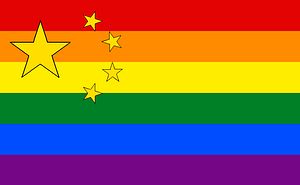Someone disappointed by India’s Supreme Court’s recent decision by to reinstate a law banning gay sex may have decided to fabricate their own positive story. Online, Chinese internet users (often called “netizens”) are posting and reposting a screenshot allegedly from CCTV, reporting that Jiangsu province has legalized gay marriage. The screenshot says that Jiangsu has become a pilot program for the country, implying that in time gay marriage might become legal across the country.
Because there has been no mention of any such program in China’s mainstream media, it seems likely that the screenshot is a fake. P or PS (short for Photoshop) was the verdict of many netizens. Still, the dialogue surrounding the posts provided an interesting glimpse of netizens’ perspective on gay marriage. “I don’t know if this is real or fake” wrote one poster, “but this way at least I can show my support.” Indeed, most of the comments on such postings were positive (although there was the occasional vomiting emoticon).
One of the most often asked questions was simply “real or fake?” Discussion ranged from technical breakdowns (the headline is longer than the customary eight characters, as one user pointed out) to the cynical, that such a move would be impossible in China. Yet as one commenter posted, “whether this is real or fake, in the future there will definitely be such a day.” The very fact that so many people posted the image shows that at least some in China find the idea of legalized gay marriage plausible.
In China, as in many countries, there is growing acceptance of homosexuality among urban youths. This demographic are also the most likely to be active online, explaining the preponderance of positive comments on the supposed CCTV screenshot. As a result, there are an increasing number of LGBT organizations and events held across China. A gay rights organization in Beijing holds an annual “Queer Film Festival.” LGBT organizations in Shanghai have held the week-long ShanghaiPRIDE event for the past five years.
Jiangsu province, whether or not it actually legalized gay marriage, is already famous for being the site of China’s first “gay wedding.” In 2010, two men held a wedding ceremony in Changzhou in the presence of their friends. Although the marriage had no legal standing, the wedding was publicized in China’s state media, including the Global Times. “Even though we did not have legal marriage documents, our civil wedding ceremony was blessed by so many friends that it will always remind us of our love and the responsibility of being loyal to each other,” said one of the grooms.
While the Jiangsu couple clearly felt comfortable publicizing their relationship, many homosexuals in China still feel stigmatized. Many feel pressured to marry and have children, leading to a new phenomenon of so-called “cooperative marriages”. where gay men marry lesbians to placate both sets of parents. There are even several online dating sites designed to set up these partnerships. Still, despite this alternative and slowly growing acceptance, many choose to hide their sexuality. In 2010, Qingdao professor Zhang Beichuan told China Daily that he estimated more than 80 percent of gay men in China are married to heterosexual women.
The gay community continues to gain acceptance in China, but it’s a slow process. Part of the problem is that China’s government is wary of activists gathering to support any cause, whether it’s gay rights, environmental protection, or the ultimate bete noire, democracy. LGBT groups have had their events (from film festivals to parades) shut down at the last minute, not because the government opposes gay rights, but because it opposes organized mass events in general. As Yang Yang, organizer of Beijing’s Queer Film Festival, told The Economist, in China “everything is political.” Given this limitation, it’s hard for LGBT activists to create an organized campaign on behalf of gay rights, including gay marriage.
That means the day when Jiangsu actually legalizes gay marriage could be far in the future — but China’s netizens are sure it’s coming.
Shannon Tiezzi is Associate Editor of The Diplomat.

































